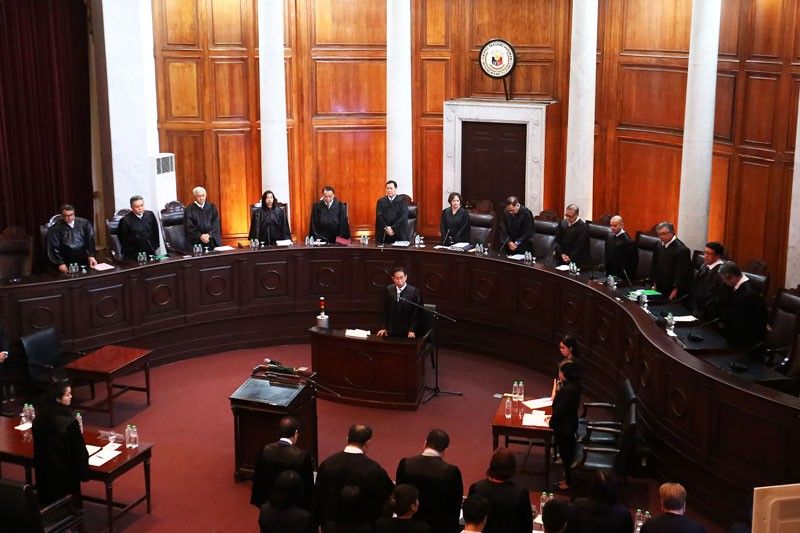People v. Salinas (G.R. No. 107204, May 06, 1994)
302 Phil. 305

FIRST DIVISION
[ G.R. No. 107204, May 06, 1994 ]
PEOPLE OF THE PHILIPPINES, PLAINTIFF-APPELLEE, VS. BENITO SALINAS Y SILLO, ACCUSED-APPELLANT.
D E C I S I O N
CRUZ, J.:
In seeking the reversal of his conviction for the rape of a 13-year old girl, the appellant raises only questions of credibility and invokes the constitutional presumption of innocence in his favor. This does not necessarily mean that the appeal should be automatically rejected on the basis of the settled doctrine that the factual findings of the trial court are as a rule received with respect and even as conclusive by the appellate court. What it does mean is that the accepted exceptions to this principle must be established by the defense if the appeal is to succeed and the judgment of the court a quo is to be set aside.
The appellant is a 25-year old neighbor of the alleged victim, Merly Alonzo, who was living just across the street from his house in Pandacan, Manila, at the time of the incident in question.[1] She claimed that at about half past two in the early morning of December 19, 1991, while she was sleeping alone in her bedroom, she was awakened by the sound of the closing of the door leading to the terrace on the second floor of her house. As she sat up, Benito Salinas, whom she recognized immediately by the light in her room, covered her mouth with one hand and pointed a fan knife at her neck, threatening her to keep quiet. Shirtless, he completed his nakedness by pulling off his short pants and briefs. He ordered her to lie down, yanked off her short pants and panty and lay on top of her. He mashed her breasts and kissed her lips and other parts of her body. She was struggling all the while, and when he came down to her vagina she pulled his hair. He tried to penetrate her vagina with his penis but succeeded not even halfway because she kept resisting him and turning on her side to prevent entry. Only the head of the penis could force its way. Even so, she felt intense pain. Frustrated in his blunt efforts to engage her, Salinas withdrew. After repeating his threat to kill her if she reported the attack, he put on his short pants and while holding his briefs jumped down from the terrace.[2]
The girl kept quiet until two days later, when she finally told her brother, Alexander, what had happened.[3] The two of them then related the outrage to their parents, who lost no time in reporting it to the authorities.[4] That same day, Merly underwent a medical and physical examination made by Dr. Ma. Cristina B. Freyra of the Crime Laboratory in Camp Crame.[5] In due time, the corresponding information for rape was filed against Salinas before the Regional Trial Court of Manila.[6]
The evidence for the prosecution consisted of the testimonies of Merly herself and the examining physician, who also submitted a written report.[7] While affirming that there was no external sign of violence on Merly's person, particularly her vagina, the doctor also said it was possible for this organ to be penetrated without tearing of the hymen.[8]
In his defense, Salinas pleaded alibi, claiming that at the precise time of the alleged rape, he was sleeping in his house when he was awakened by the knocking on their door of his sister Glenda, who was returning from a party with a friend.[9] Glenda corroborated this statement and added that Salinas was still sleeping on the sofa when she left at 4:00 a.m. to hear a misa de gallo.[10] Salinas also suggested that he was charged with rape by Merly because she had earlier unjustly suspected him of peeping at her.[11]
After considering the evidence of the parties, Judge Domingo D. Panis rendered judgment on August 14, 1992, finding Benito Salinas guilty beyond reasonable doubt of the crime of rape and sentencing him to suffer the penalty of reclusion perpetua. The accused was also ordered to indemnify Merly Alonzo in the sum of P20,000.00, "and the further sum of P30,000.00 as and by way of moral damages.”[12]
In his brief, the appellant now faults the trial court for disbelieving his alibi and giving credence instead to Merly's testimony despite its many inconsistencies. He stresses that his whereabouts at the time of the alleged incident were clearly established by him and his sister and that, by contrast, Merly's testimony had no corroboration, not even from the physician who examined her after the claimed rape.
The defense also emphasizes that during the supposed attack, Merly offered no resistance and made no outcry although her brother and sister were sleeping in the other rooms on the same floor and her parents were with their niece and nephews downstairs. Incredibly, it took all of two days before it occurred to her to report the outrage to her parents. Most importantly, the lack of any sign of external violence on her vagina and her intact hymen belied her claimed defilement.
Salinas' alibi was corroborated only by his own sister, whose credibility would naturally be suspect. Moreover, assuming she was telling the truth, we do not find it impossible for Salinas to sprint to the house across the street at 2:30 a.m., rape Merly, and return to his sofa before 4 a.m., when Glenda found him still sleeping there. That kind of alibi cannot stand against his positive identification by the victim herself, who had known him since childhood[13] and saw him clearly by the light in her room that morning.[14]
It is not true that she did not resist Salinas' attack for the record shows that she tried to push him away and pulled his hair and averted her face from him. She kept turning on her side to avoid his penis. If she did not cry out for help, it was because of the knife he was carrying to command her submission and silence. Even if he might have laid the weapon down as he attacked her, it was still there within his reach to daunt the 13-year old girl, who could have been intimidated enough by the mere strength and presence of the unwelcome man in her room.
As for the intact hymen, this is no proof that no rape had been committed. A broken hymen is not an essential element of rape, not even where the victim is an innocent child like Merly. As the trial court correctly observed:
The fact that the hymen has not been lacerated is of no moment. The victim being of tender age, the penetration of the male organ could go only as deep as the labia. In any case, for rape to be committed, full penetration is not required. It is enough that there is proof of entrance of the male organ within the labia or pudendum of the female organ. Even the slightest penetration is sufficient to consummate the crime of rape. Perfect penetration, rupture of the hymen or laceration of the vagina are not essential for the offense of consummated rape. Entry, to the least extent, of the labia or lips of the female organ is sufficient. Remaining a virgin does not negate rape (People vs. Castro, 196 SCRA 679, 685).
In rape cases, there are no half measures or even quarter measures nor is their gravity graduated by the inches of entry. Partial penile penetration is as serious as full penetration; the rape is deemed consummated in either case. In a manner of speaking, bombardment of the drawbridge is invasion enough even if the troops do not succeed in entering the castle.
The claimed inconsistencies in Merly's testimony do not vitiate it but only stress her difficulties in estimating time and distance, as when she said the incident took place at about 2:30 a.m. when it could have been earlier or later; or that Salinas inserted his penis in her vagina for ten minutes when it could have been for a shorter period; or that he stayed in her room for one and a half hour although a half hour or less was more believable; or that he jumped down from a height of ten meters when it was actually about only ten feet. These flaws, if flaws they are, would only stress the believability of Merly's unrehearsed and imperfect testimony and, in any case, do not impair its essential veracity and consistency.
Finally, we hold that the cases of People v. Villarin[15] and People v. Dulay,[16] where the accused were acquitted, are not applicable to the case at bar. In both cases, an amorous relationship was established between the parties to negate the charge of intimidation and violence upon the complainants. No such relationship was shown to exist between Salinas and Merly.
We are satisfied that sufficient evidence has been established against the appellant to overcome the constitutional presumption of innocence in his favor and establish his guilt of the crime charged beyond reasonable doubt. We shall therefore sustain the appealed judgment except only as to the monetary award.
WHEREFORE, the appeal is DISMISSED and the challenged decision is AFFIRMED. The award of civil indemnity and moral damages is, however, hereby reduced to P30,000.00. Costs against the appellant.
SO ORDERED.
Davide, Jr., Bellosillo, Quiason, and Kapunan, JJ., concur.
[1] TSN, July 20, 1992, p. 3.
[2] TSN, February 26, 1992, pp. 5-15; TSN, March 2, 1992, pp. 6-24.
[3] TSN, February 26, 1992, pp. 11-12.
[4] Ibid., pp. 13-14.
[5] Id., p. 14.
[7] Ibid., p. 5.
[8] TSN, March 9, 1992, pp. 6-7.
[9] TSN, July 20, 1992, pp. 4-5.
[10] TSN, July 21, 1992, pp. 3-5.
[11] TSN, July 20, 1992, p. 9.
[12] Rollo, p. 19.
[13] TSN, February 26, 1992, p. 5.
[14] Ibid., p. 6.
[15] 218 SCRA 165.
[16] 217 SCRA 132.







0 Comments